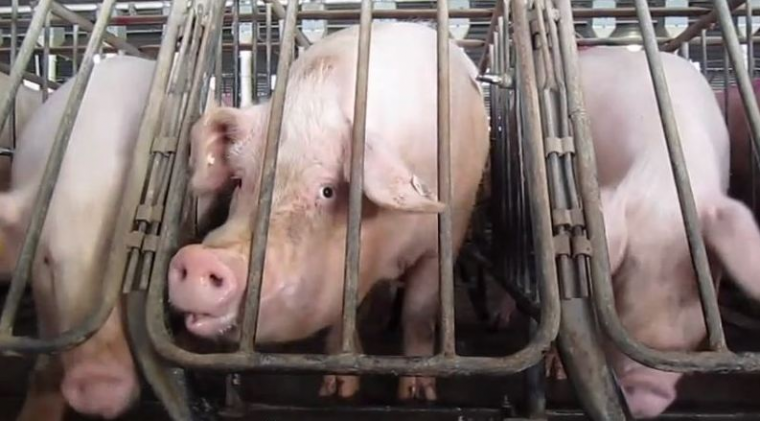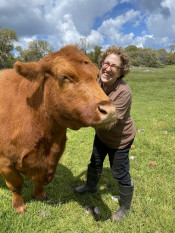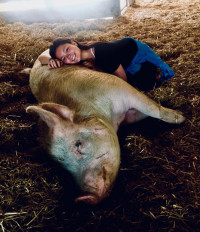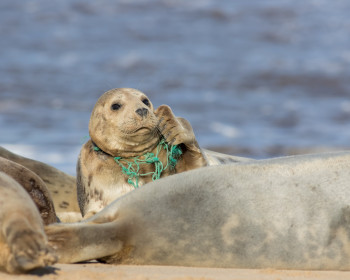The EATS Act: A Dangerous Step Backwards for Farmed Animal Protection
As we honor World Farmed Animal Day, Professor Joyce Tischler and 3L Akela Baldwin share what you should know to protect important legal advancements made for farmed animals.
Open gallery

Credit: Humane Society of the United States, CC by 3.0
This summer, Senator Roger Marshall (R-Kansas) introduced the Ending Agriculture Trade Suppression Act, or EATS Act, into Congress. If passed, this new federal law will “prevent States and local jurisdictions from interfering with the production and distribution of agricultural products in interstate commerce…” The Act will essentially override any state law that regulates agricultural products within that state’s borders and prevent states from impeding agricultural trade from other states within the United States. That will be terrible for farmed animals.
How did we get to this point?
In the U.S., we raise and slaughter 9 billion farmed animals annually. There is no federal law in the U.S. that sets minimum standards for how farmed animals are raised. There is a federal Humane Methods of Slaughter Act and a federal transport law (28 Hour Act), but with no federal law covering the 99% of time farmed animals are alive, the “standards” are set by the industries that utilize those animals to produce meat, dairy and eggs. The industry regularly confines sows (female breeding pigs) in cages that resemble coffins with metal bars; they are so small that the sows cannot even turn around. Hens who lay eggs are confined in battery cages, where they have no room to spread their wings, no privacy, or ability to get away from more aggressive birds. Over the past two decades, animal advocates have fought at the state level to pass ballot initiatives that improve the welfare of such farmed animals.
In California, voters passed Proposition (Prop.) 2 in 2008. This law mandated that “a person shall not tether or confine any covered animal, on a farm, for all or the majority of any day, in a manner that prevents such animal from:
(a) Lying down, standing up, and fully extending his or her limbs; and
(b) Turning around freely.”
The California legislature followed that by passing AB 1437, which requires that, regardless of where they were produced, all shell (whole) eggs sold in CA be produced under the same minimum standards as Prop 2. And, in 2018, California acted once again to improve the treatment of farmed animals. Proposition (Prop.) 12 directs that, starting in 2020:
- Egg-laying hens are required to have one square foot of floor space.
- Each calf raised for veal would be required to have 43 square feet of floor space. And, starting in 2022:
- Egg-laying hens must be in cage-free housing.
- Breeding pigs (sows) are required to have 24 square feet of floor space per pig.
In addition to providing specific space requirements for animals covered by the Act, Prop. 12 makes it illegal for businesses to knowingly sell eggs, liquid eggs, uncooked pork, or veal that comes from animals housed in ways that do not meet the new requirements. This ban applies to products from both California and from out-of-state. These mandates are the strongest protections that farmed animals receive in the U.S.
In response, the National Pork Producers Council and the American Farm Bureau sued California, alleging that Prop. 12 violates the dormant Commerce Clause. That lawsuit was dismissed by the U.S. District Court and the 9th Circuit Court of Appeals affirmed the dismissal. The U.S. Supreme Court granted certiorari and heard the case.
The Supreme Court’s decision in National Pork Producers Council & American Farm Bureau Federation v. Ross, et al., was issued on May 11, 2023, and California’s Prop. 12, (aka, the Prevention of Cruelty to Farm Animals Act) was upheld. Soon after that decision was published, the EATS Act was introduced.
The goal of the EATS Act’ is to “reverse the effects of Proposition 12.” According to Senator Chuck Grassley (R-IA), one of the EATS Act’s cosponsors, “California’s Proposition 12 is going to hurt the economy of Iowa, which is number one in pork production,” and this problem can be solved by passing the EATS Act because it ensures that “Iowa pork can be sold everywhere in the nation.” These lawmakers propose to include the EATS Act in the 2023 Farm Bill, an omnibus bill reauthorized by Congress every five years. The Farm Bill is the single most important law that sets federal policy for how agriculture, food systems and anti-hunger programs will be carried out. It is deeply concerning that the heightened political opposition by Big Ag to Prop. 12, combined with Big Ag’s tremendous power in policy-making decisions could drive the EATS Act forward, unlike its previous attempts to pass similar bills.
Why The EATS Act Will Devastate Animal Welfare Laws
Creating more humane treatment for farmed animals has been shown to be something that is widely supported by American consumers and voters. Prop. 12 was approved by a whopping 63% of California voters. A survey in 2022 found that about 80 percent of 1,353 likely voters nationally believe that preventing farm animal cruelty is a moral concern and would support laws banning animal confinement in their state. Another survey conducted by the American Society for the Prevention of Cruelty to Animals found that 88% of 1,000 American adults somewhat-to-strongly favor CAFO (industrialized) farmers transitioning to more humane systems of agriculture, and 82% somewhat-to-strongly favor the government offering CAFO farmers money to help cover the costs of those transitions.
Consistent with public sentiment, over the past two decades animal advocates have worked tirelessly to pass state ballot initiatives and bills that have improved life for farmed animals in those states, by banning the most egregious forms of confinement. The EATS Act would wipe out two decades of sorely needed progress.
Further, the EATS Act would prohibit states from banning the sale of agricultural products on cruelty grounds, thereby maintaining the stranglehold of Big Ag companies that cheaply and inhumanely produce colossal amounts of animal products, with little to no regard for the suffering they create.
The EATS Act harms not only farmed animals, but countless other animals who desperately need strengthened animal welfare standards. The Act broadly covers “any agricultural products,” which the Agricultural Marketing Act of 1946 defines as “any and all products raised or produced on farms and any processed or manufactured product thereof.” As a result, other progressive legislation pertaining to factory farming, puppy mills, and animal testing face potential erasure. These laws include Massachusetts Question 3, as well as laws banning the sale of foie gras derived from force-fed ducks, eggs from hens raised in battery cages, and cosmetics tested on animals.
The EATS Act’s Ripple Effects on Humans
While the EATS Act has been drafted to dismantle existing local animal protection laws, its impact could have far-reaching implications that extend beyond how animals are treated. Recently, the Harvard Animal Law & Policy Program issued a report which analyzes the EATS Act and warns that it could have widespread negative consequences on more than 1,000 state and local public health and safety regulations, as well as state laws on food safety, narcotics, labeling regulations, and other regulations that protect humans.
Encouragingly, over 200 politicians have signed a letter opposing the EATS Act, and hundreds of veterinary professionals publicly expressed that the EATS Act would violate their oath to prevent animal suffering. In addition, animal agriculture industry leaders in Pennsylvania have expressed their concerns that the EATS Act will harm their existing efforts to meet new and improved welfare standards for farmed animals under Proposition 12.
So, let us unite in sustaining the momentum of the movement towards a more humane food system. Another critically important win for animals could be in the cards for us.
How You Can Help
- The most important action you can take right now is to contact your federal legislators, and voice your concerns:
-
- You can find the names and contact information for your elected senators and representatives online.
- Ask them to oppose the EATS Act in the interest of protecting animals and humans from harmful industry practices.
- Spread the word! Share information about the dangers of the EATS Act by posting links to blogs, such as this one, on social media, or writing a blog or letter to the editor yourself. Inform others about how they can help stop the EATS Act.
- Please act now!



More Center for Animal Law Studies Stories
Center for Animal Law Studies is located in Wood Hall on the Law Campus.
MSC: 51
email cals@lclark.edu
voice 503-768-6960
Center for Animal Law Studies
Lewis & Clark Law School
10101 S. Terwilliger Boulevard MSC 51
Portland OR 97219

